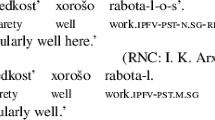Abstract
This paper discusses Bulgarian and Slovenian constructions with a dispositional reading and no apparent dispositional marker, such as Bulgarian Na Ivan mu se raboteše. Such a sentence combines a dative logical subject Ivan with an inflected verb raboteše ‘work’, and roughly corresponds to ‘Ivan was in a working mood’, so does not entail that Ivan worked. I argue that such constructions consist of two core ingredients that account both for their syntactic properties, and for their modal flavor as dispositions. One ingredient is an Imperfective Operator in Viewpoint Aspect as the source of modality. Such an Operator resembles in syntactic and semantic properties both the Progressive Operator in so-called English Futurates such as For two weeks, the Red Sox were playing the Yankees today, and the Spanish modal Imperfecto. The other ingredient is a High Applicative Phrase with an oblique subject, which, other than determining syntactic properties, contributes to a difference in modal flavor with English Futurates. English Futurates denote plans, and a hypothesis is that this is due to their nominative subjects being paired to a presupposition giving them control over the intended event. By contrast, the Slavic constructions in this paper denote dispositions, not plans, because their oblique subjects cannot be paired with a similar presupposition.
Similar content being viewed by others
References
Benedicto, Elena. 1995. Mne ne citaetsja: (Relativized) modality, datives and reflexive suffixes. Penn Working Papers in Linguistics 2(2): 1–16.
Bhaskarao, Peri, and Karumuri Venkata Subbarao, eds. 2004. Non-nominative subjects. Amsterdam: Benjamins.
Borer, Hagit. 2005. Structuring sense. Vol. 2 of The normal course of events. Oxford: Oxford University Press.
Borik, Olga. 2006. Aspect and reference time. New York: Oxford University Press.
Cinque, Guglielmo. 1999. Adverbs and functional heads. Oxford: Oxford University Press.
Cipria, Alicia, and Craige Roberts. 2000. Spanish imperfecto and pretérito: Truth conditions and Aktionsart effects in a situation semantics. Natural Language Semantics 8: 297–347.
Comrie, Bernard. 1976. Aspect. Cambridge: Cambridge University Press.
Copley, Bridget. 2002. The semantics of the future. PhD dissertation, MIT.
Cresswell, Max John. 1975. Hyperintensional logic. Studia Logica 34: 25–38.
Csirmaz, Aniko. 2006. Aspect, negation and quantifiers. In Event structure and the left periphery, ed. Katalin E. Kiss, 225–254. Berlin: Springer.
Cuervo, María Cristina. 2003. Datives at large. PhD dissertation, MIT.
De Swart, Henriette. 1998. Aspect shift and coercion. Natural Language and Linguistic Theory 16: 347–385.
Declerck, Renaat. 1979. Aspect and the bounded/unbounded (telic/atelic) distinction. Linguistics 17: 761–94.
Depraetere, Ilse. 1995. On the necessity of distinguishing between (un) boundedness and (A) telicity. Linguistics and Philosophy 18: 1–19.
den Dikken, Marcel, Richard Larson, and Peter Ludlow. 1996. Intensional transitive verbs and Concealed Complement Clauses. Rivista di Linguistica 8: 29–46.
Dimitrova-Vulchanova, Mila. 1996. Verb semantics, diathesis, and aspect. PhD dissertation, The Norwegian University of Science and Technology, Trondheim
Dimitrova-Vulchanova, Mila, and Giuliana Giusti. 1998. Possessors in the Bulgarian DP. In Topics in South Slavic syntax and semantics, eds. Mila Dimitrova-Vulchanova and Lars Hellan, 163–192. Amsterdam: Benjamins.
Dowty, David R. 1977. Toward a semantic analysis of verb aspect and the English imperfective paradox. Linguistics and Philosophy 1: 45–78.
Dowty, David R. 1979. Word meaning and Montague Grammar. Dordrecht: Reidel.
Ernst, Thomas. 2002. The syntax of adjuncts. Cambridge: Cambridge University Press.
Filip, Hanna. 2000. The quantization puzzle. In Events as grammatical objects, eds. James Pustejovsky and Carol Tenny, 3–60. Stanford: CSLI.
Filip, Hanna. 2003. Prefixes and the delimitation of events. Journal of Slavic Linguistics 11: 55–101.
Filip, Hanna. 2005. On accumulating and having it all. In Perspectives on aspect, eds. Henk Verkuyl, Henriette de Swart, and A. Van Hout, 125–148. Berlin: Springer.
Franks, Steven. 1995. Parameters of Slavic morphosyntax. New York: Oxford University Press.
Giorgi, Alexandra, and Fabio Pianesi. 1997. Tense and aspect. New York: Oxford University Press.
Iatridou, Sabine, Elena Anagnastopoulou, and Roumyana Izvorski. 2001. Observations about the form and meaning of the perfect. In Ken Hale: A life in language, ed. Michael Kenstowicz, 189–238. Cambridge: MIT Press.
Istratkova, Viara. 2004. On multiple prefixation in Bulgarian. Nordlyd 32(2): 301–321.
Kallulli, Dalina. 2006. Unaccusatives with dative causers and experiencers: A unified account. In Datives and other cases, eds. Daniel Hole, André Meinunger, and Werner Abraham, 271–301. Amsterdam: Benjamins.
Kallulli, Dalina. 2007. Rethinking the passive/anticausative distinction. Linguistic Inquiry 38: 770–780.
Kamp, Hans, and Uwe Reyle. 1993. From discourse to logic. London: Kluwer.
Krapova, Iliyana. 1998. The system of auxiliaries in Bulgarian. In Topics in South Slavic syntax and semantics, eds. Mila Dimitrova-Vulchanova and Lars Hellan, 59–90. Amsterdam: Benjamins.
Krapova, Iliyana. 2001. Subjunctives in Bulgarian and Modern Greek. In Comparative syntax of Balkan languages, eds. María-Luisa Rivero and Angela Ralli, 105–126. New York: Oxford University Press.
Kratzer, Angelika. 1981. The notional category of modality. In Words, worlds, and contexts, eds. Hans-Jürgen Niekmeyer and Hannes Rieser, 38–74. Berlin: Walter de Gruyter.
Kratzer, Angelika. 1991. Modality. In Semantics: An international handbook of contemporary research, eds. Arnim von Stechow and Dieter Wunderlich, 639–650. New York: Walter de Gruyter.
Kratzer, Angelika. 1996. Severing the external argument from its verb. In Phrase structure and the lexicon, eds. Johan Rooryck and Laurie Zaring, 109–138. Dordrecht: Kluwer.
Landman, Fred. 1992. The progressive. Natural Language Semantics 1: 1–32.
Larson, Richard. 2002. The grammar of intensionality. In Logical Form and language, eds. Gerhard Preyer and Georg Peter, 228–262. New York: Oxford University Press.
Maienborn, Claudia. 2001. On the position and interpretation of Locative modifiers. Natural Language Semantics 9: 191–240.
Marantz, Alec. 1993. Implications of asymmetries in double object constructions. In Theoretical aspects of Bantu grammar, ed. Sam Mchombo, 113–150. Stanford: CSLI.
Marušič, Franc, and Rok Žaucer. 2004. A reanalysis of the Slovenian dative-reflexive construction. Formal Approaches to Slavic Linguistics 12: 293–312.
Marušič, Franc, and Rok Žaucer. 2006. On the intensional FEEL-LIKE construction in Slovenian: A case of a phonologically null verb. Natural Language and Linguistic Theory 24: 1093–1159.
Portner, Paul. 1998. The progressive in modal semantics. Language 74: 760–788.
Pylkkänen, Liina. 2002. Introducing arguments. PhD dissertation, MIT.
Rivero, María-Luisa. 1992. Adverb incorporation and the syntax of adverbs in Modern Greek. Linguistics and Philosophy 15: 289–331.
Rivero, María-Luisa. 1994. Clause structure and V-movement in the languages of the Balkans. Natural Language and Linguistic Theory 12: 63–120.
Rivero, María-Luisa. 2003. Reflexive clitic constructions with datives: syntax and semantics. Formal Approaches to Slavic Linguistics 11: 469–494.
Rivero, María-Luisa. 2004. Datives and the non-active voice/reflexive clitics in Balkan languages. In Balkan syntax and semantics, ed. Olga M. Tomić, 237–267. Amsterdam: Benjamins.
Rivero, María-Luisa. 2005. Topics in Bulgarian morphology and syntax. Lingua 115(8): 1083–1128.
Rivero, María-Luisa, and Milena Milojević Sheppard. 2003. Indefinite reflexive clitics in Slavic: Polish and Slovenian. Natural Language and Linguistic Theory 21: 89–155.
Rivero, María-Luisa, and Milena Milojević Sheppard. 2008. Revisiting involuntary state constructions in Slovenian. In Studies in formal slavic linguistics: contributions from FDSL 6.5 conference (formal description of Slavic languages conference 6.5), eds. Franc Marušič and Rok Žaucer, 273–288. Frankfurt: Peter Lang.
Scatton, Ernest. 1984. A reference grammar of Modern Bulgarian. Columbus: Slavica.
Sedighi, Anousha. 2007. Agreement restrictions in Persian. Amsterdam: Rozenberg.
Siloni, Tali. 1997. Noun phrases and nominalizations: The syntax of DPs. Dordrecht: Kluwer.
Slabakova, Roumyana. 2005. Perfective prefixes: What they are, what flavors they come in, and how they are acquired. Formal Approaches to Slavic Linguistics 13: 324–341.
Slovar slovenskega knjižnega jezika. (SSKJ) 1970–1991. [Dictionary of the Slovenian Language]. Ljubljana: Državna založbe Slovenije.
Smith, Carlota S. 1991. The parameter of aspect. Dordrecht: Kluwer.
Stowell, Tim. 1981. Origins of phrase structure. PhD Dissertation. MIT.
Stowell, Tim. 1982. The tense of infinitives. Linguistic Inquiry 19: 561–570.
Svenonius, Peter. 2002. Subject positions and the placement of adverbials. In Subject, expletives, and the EPP, ed. Peter Svenonius, 201–242. New York: Oxford University Press.
Svenonius, Peter. 2005. Slavic prefixes inside and outside VP. In Nordlyd 32.2: Special issue on Slavic prefixes, ed. Peter Svenonius, 205–253. Tromsø: CASTL.
Tenny, Carol. 2000. Core events and adverbial modification. In Events as grammatical objects, eds. Carol Tenny and James Pustejovsky, 285–334. Stanford: CSLI.
Tilkov, Dimitar, Stojan Stojanov, and Konstantin Popov. 1982–1983. Gramatica na savremennija balgarski knižoven ezik. Vols. 1–3. Sofia: Bulgarska Akademija na Naukite.
Travis, Lisa. 2000. Event structure in syntax. In Events as grammatical objects, eds. Carol Tenny and James Pustejovsky, 145–185. Stanford: CSLI.
Travis, Lisa. 2003. Lexical items and zero morphology. In Proceedings of the 6th generative approaches to second language acquisition conference (GASLA 2002), eds. Juana M. Liceras, Helen Goodluck, and Helmut Zobl, 315–330. Somerville: Cascadilla.
Travis, Lisa de Mena. 2008. Inner aspect. The articulation of VP. Manuscript, McGill University.
Verkuyl, Henk, J. 1993. A theory of aspectuality. Cambridge: Cambridge University Press.
Verkuyl, Henk, J. 1998. Tense, aspect, and aspectual composition. In Topics in South Slavic syntax and semantics, eds. Mila Dimitrova-Vulchanova and Lars Hellan, 125–162. Amsterdam: Benjamins.
Verma, Manindra, K. and K.P. Mohanan, eds. 1991. Experiencer subjects in South Asian languages. Stanford: CSLI.
von Fintel, Kai, and Irene Heim. 2007. Intensional semantics lecture notes. http://ocw.mit.edu/NR/rdonlyres/Linguistics-and-Philosophy/24-973Spring-2005/19058019-AB15-4760-868A-52AEC2CAFA3C/0/intensnlsemantic.pdf. Accessed 17 October 2008.
Wiltschko, Martina. 2003. On the interpretability of tense on D and its consequences for case theory. Lingua 113: 659–696.
Zucchi, Sandro. 1999. Incomplete events, intensionality, and imperfective aspect. Natural Language Semantics 7: 179–215.
Author information
Authors and Affiliations
Corresponding author
Additional information
This paper was partially subsidized by SSHRC Research Grant 410-2006-0150. Special thanks go to Milena M. Sheppard for joint work that made the proposals in this article possible, to Nikolay Slavkov for constant intellectual help on Bulgarian, to Dalina Kallulli for much useful advice through the years, and to Rok Žaucer for numerous suggestions beyond the call of duty on a topic where we seem to disagree. Earlier versions have also benefited from very useful comments from three anonymous reviewers, and from Marcel den Dikken. Usual disclaimers apply. Abbreviations are as follows: 1, 2, 3 = First, Second, and Third Person. Aor = Aorist (Bulgarian). Aux = Auxiliary Verb for Past. Dat = Dative. Fut = Future Auxiliary or Particle. Imp = Imperfect (Bulgarian) and Imperfecto (Spanish). Inf = Infinitive. Neg = Negation. Neu = Neuter. Nom = Nominative. P = Preposition as Dative Marker. Pl = Plural. Pf = Perfective prefix. Pret = Preterit or Pretérito (Spanish). Pple = Participle. Q = Question Particle (Bulgarian). Refl = Reflexive Clitic. Sg = Singular.
Rights and permissions
About this article
Cite this article
Rivero, M.L. Intensionality, high applicatives, and aspect: involuntary state constructions in Bulgarian and Slovenian. Nat Lang Linguist Theory 27, 151–196 (2009). https://doi.org/10.1007/s11049-008-9059-8
Received:
Accepted:
Published:
Issue Date:
DOI: https://doi.org/10.1007/s11049-008-9059-8




